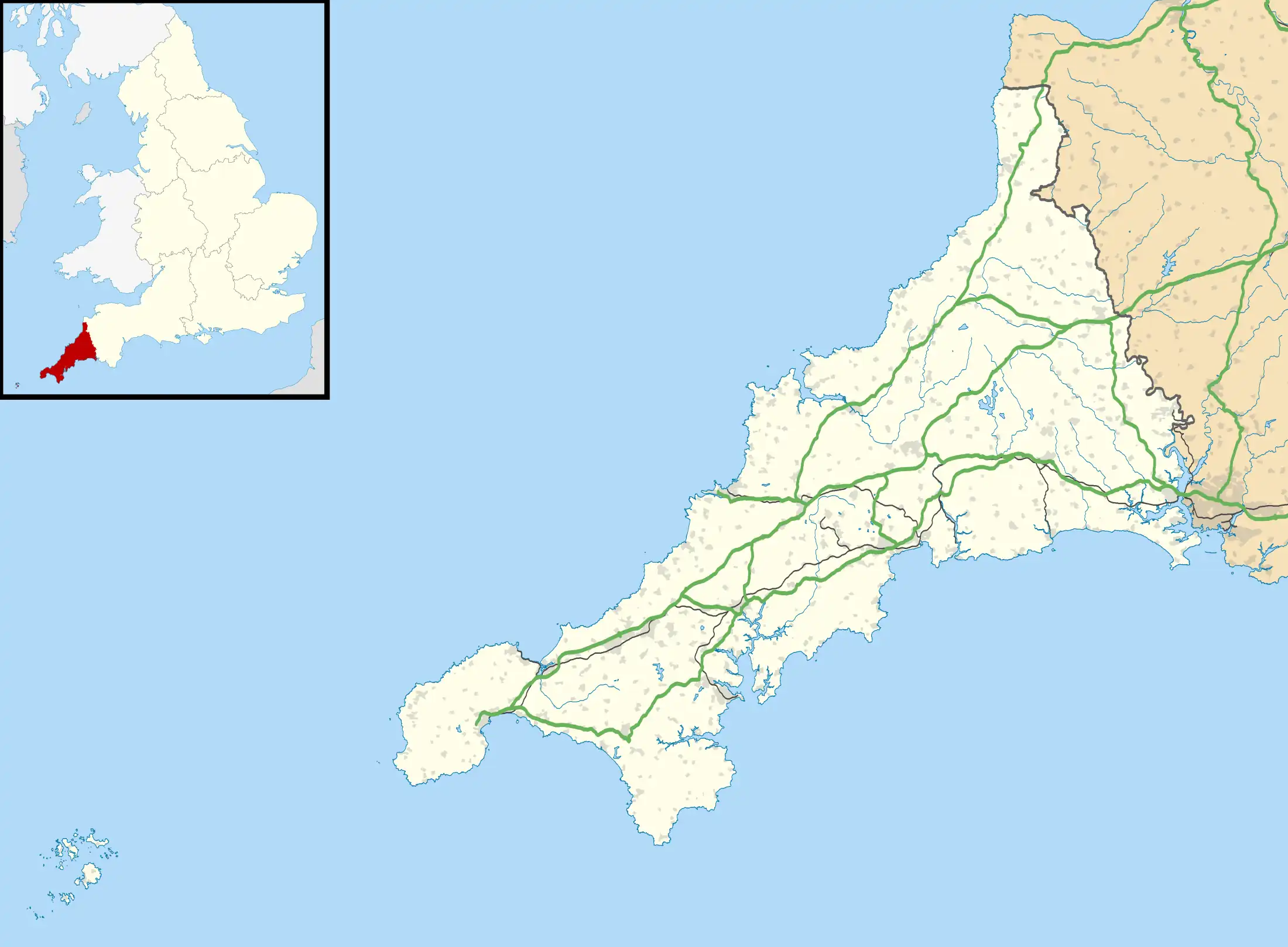Saltash Guildhall
Saltash Guildhall is a municipal building in Fore Street, Saltash, Cornwall, England. The structure, which was the meeting place of Saltash Borough Council, is a Grade II listed building.[1]
| Saltash Guildhall | |
|---|---|
 Saltash Guildhall | |
| Location | Fore Street, Saltash |
| Coordinates | 50.4084°N 4.2093°W |
| Built | 1780 |
| Architectural style(s) | Neoclassical style |
Listed Building – Grade II | |
| Official name | The Guildhall |
| Designated | 17 January 1952 |
| Reference no. | 1140371 |
 Shown in Cornwall | |
History
The first municipal building in Saltash was a small medieval guildhall with a bell turret on the north west corner of Alexandra Square.[2] A lock up for petty criminals was established behind the first building in 1818.[3] After becoming dilapidated in the mid 19th century, it was ultimately demolished in 1894.[4]
The second municipal building was a 16th century market house located about 50 yards (46 m) to the east of the original building.[2] It was reconstructed in the neoclassical style in brick and masonry between 1775 and 1780.[2] The market house was originally arcaded on the ground floor, so that markets could be held, with an assembly hall, known as the Long Room, on the first floor.[2] A series of Doric order columns supported the first floor structure.[2] Saltash had a very small electorate and a dominant patron (the Buller family), which meant it was recognised by the UK Parliament as a rotten borough: the right of the borough to elect members of parliament was removed by the Reform Act 1832.[5] In 1841, borough officials decided to relocate from the original guildhall to the Long Room in the market house which then became the new headquarters of the borough.[2] The borough council, which continued to meet in the new guildhall, was reformed under the Municipal Corporations Act 1883.[6][7]
The west end of the ground floor was enclosed to create a soup kitchen in 1888, the east end of the ground floor was partitioned off to create a fire station in 1903, and the central section was enclosed in 1910.[2] The design at that time involved an asymmetrical main frontage facing onto Fore Street; on the ground floor, there was a round headed doorway with a canopy in the third bay from the right and round headed sash windows in most of the other bays.[1] Meanwhile, on the first floor there were five round headed sash windows.[1] At the west end, on the ground floor, there was another round headed doorway with a canopy, on the first floor there were two round headed sash windows and, at roof level, there was a central panel containing the borough coat of arms surmounted by a small pediment with a carving in the tympanum.[1] Internally, the principal room was the council chamber.[8]
The doctor and suffragette, Mabel L. Ramsay, gave a speech to an audience in the guildhall in September 1910 explaining how infant mortality was significantly better in countries such as New Zealand where woman already had voting rights.[9] A major programme of refurbishment works, which involved the renovation of the north wall and the roof, was completed in 1925.[10]
The guildhall continued to serve as the headquarters of the borough council for much of the 20th century[11] but ceased to be the local seat of government after the enlarged Caradon District Council was formed in 1974.[12] The guildhall subsequently accommodated the offices and meeting place of Saltash Town Council as well as the local tourist information office.[13] With financial support from the Heritage Lottery Fund, further restoration work was carried out in 1998.[14] The Duchess of Gloucester inaugurated the Saltash Blue Plaque Trail at the guildhall in September 2016.[15]
References
- Historic England. "The Guildhall (1140371)". National Heritage List for England. Retrieved 5 August 2021.
- "Saltash Guildhall". Saltash History and Heritage. Retrieved 5 August 2021.
- "Saltash Town Gaol". Prison History. Retrieved 5 August 2021.
- "Elevation of granite bell turret to old Saltash Guildhall". Kresen Kernow. 1966. Retrieved 5 August 2021.
- "The History of Politics: The Rotten Boroughs of England". Julia Herdman Books. 21 April 2017. Retrieved 21 October 2019.
- Municipal Corporations Act 1883 (46 & 46 Vict. Ch. 18) (PDF). 1883. Retrieved 21 December 2021.
- "Saltash MB". Vision of Britain. Retrieved 5 August 2021.
- "Facilities for hire". Saltash Town Council. Retrieved 5 August 2021.
- Andrews, Maggie; Lomas, Janis (2018). Hidden Heroines: The Forgotten Suffragettes. The Crowood Press. p. 34. ISBN 978-0719827617.
- Beacham, Peter; Pevsner, Nikolaus (2014). Cornwall (The Buildings of England). New Haven: Yale University Press. p. 610. ISBN 978-0300126686.
- "No. 45730". The London Gazette. 20 July 1972. p. 8690.
- Local Government Act 1972. 1972 c.70. The Stationery Office Ltd. 1997. ISBN 0-10-547072-4.
- "Saltash Walk Gallery". BBC. Retrieved 5 August 2021.
- "Guildhall, Saltash - Restoration". Heritage Lottery Fund. Retrieved 5 August 2021.
- "Kensington Palace". The Royal Family. 8 September 2016. Retrieved 5 August 2021.